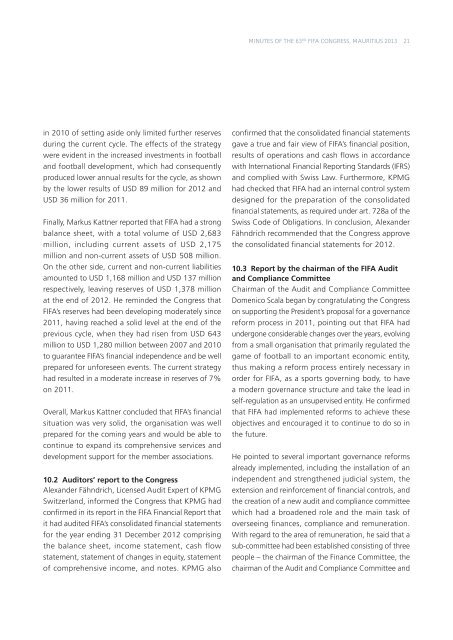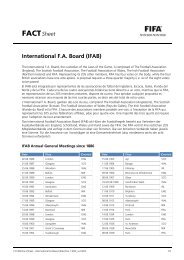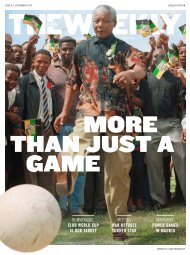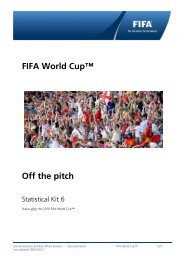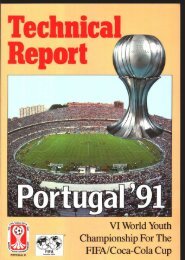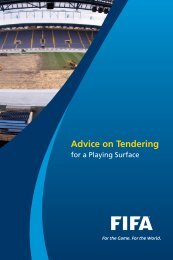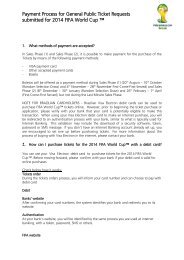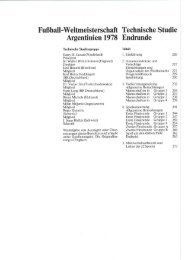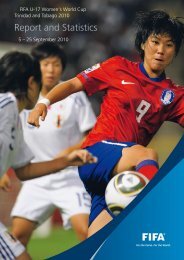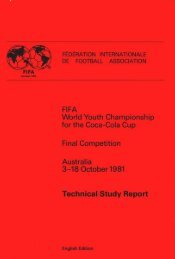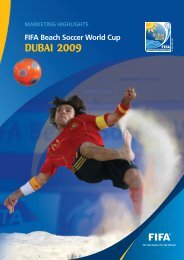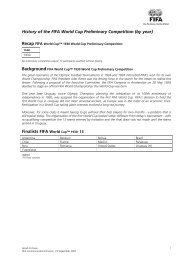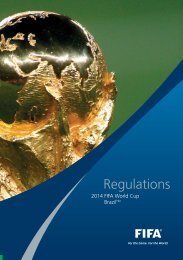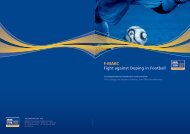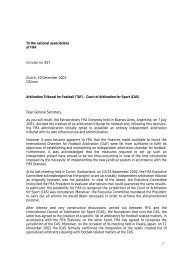MINUTES - FIFA.com
MINUTES - FIFA.com
MINUTES - FIFA.com
Create successful ePaper yourself
Turn your PDF publications into a flip-book with our unique Google optimized e-Paper software.
<strong>MINUTES</strong> OF THE 63 RD <strong>FIFA</strong> CONGRESS, MAURITIUS 2013 21<br />
in 2010 of setting aside only limited further reserves<br />
during the current cycle. The effects of the strategy<br />
were evident in the increased investments in football<br />
and football development, which had consequently<br />
produced lower annual results for the cycle, as shown<br />
by the lower results of USD 89 million for 2012 and<br />
USD 36 million for 2011.<br />
Finally, Markus Kattner reported that <strong>FIFA</strong> had a strong<br />
balance sheet, with a total volume of USD 2,683<br />
million, including current assets of USD 2,175<br />
million and non-current assets of USD 508 million.<br />
On the other side, current and non-current liabilities<br />
amounted to USD 1,168 million and USD 137 million<br />
respectively, leaving reserves of USD 1,378 million<br />
at the end of 2012. He reminded the Congress that<br />
<strong>FIFA</strong>’s reserves had been developing moderately since<br />
2011, having reached a solid level at the end of the<br />
previous cycle, when they had risen from USD 643<br />
million to USD 1,280 million between 2007 and 2010<br />
to guarantee <strong>FIFA</strong>’s financial independence and be well<br />
prepared for unforeseen events. The current strategy<br />
had resulted in a moderate increase in reserves of 7%<br />
on 2011.<br />
Overall, Markus Kattner concluded that <strong>FIFA</strong>’s financial<br />
situation was very solid, the organisation was well<br />
prepared for the <strong>com</strong>ing years and would be able to<br />
continue to expand its <strong>com</strong>prehensive services and<br />
development support for the member associations.<br />
10.2 Auditors’ report to the Congress<br />
Alexander Fähndrich, Licensed Audit Expert of KPMG<br />
Switzerland, informed the Congress that KPMG had<br />
confirmed in its report in the <strong>FIFA</strong> Financial Report that<br />
it had audited <strong>FIFA</strong>’s consolidated financial statements<br />
for the year ending 31 December 2012 <strong>com</strong>prising<br />
the balance sheet, in<strong>com</strong>e statement, cash flow<br />
statement, statement of changes in equity, statement<br />
of <strong>com</strong>prehensive in<strong>com</strong>e, and notes. KPMG also<br />
confirmed that the consolidated financial statements<br />
gave a true and fair view of <strong>FIFA</strong>’s financial position,<br />
results of operations and cash flows in accordance<br />
with International Financial Reporting Standards (IFRS)<br />
and <strong>com</strong>plied with Swiss Law. Furthermore, KPMG<br />
had checked that <strong>FIFA</strong> had an internal control system<br />
designed for the preparation of the consolidated<br />
financial statements, as required under art. 728a of the<br />
Swiss Code of Obligations. In conclusion, Alexander<br />
Fähndrich re<strong>com</strong>mended that the Congress approve<br />
the consolidated financial statements for 2012.<br />
10.3 Report by the chairman of the <strong>FIFA</strong> Audit<br />
and Compliance Committee<br />
Chairman of the Audit and Compliance Committee<br />
Domenico Scala began by congratulating the Congress<br />
on supporting the President’s proposal for a governance<br />
reform process in 2011, pointing out that <strong>FIFA</strong> had<br />
undergone considerable changes over the years, evolving<br />
from a small organisation that primarily regulated the<br />
game of football to an important economic entity,<br />
thus making a reform process entirely necessary in<br />
order for <strong>FIFA</strong>, as a sports governing body, to have<br />
a modern governance structure and take the lead in<br />
self-regulation as an unsupervised entity. He confirmed<br />
that <strong>FIFA</strong> had implemented reforms to achieve these<br />
objectives and encouraged it to continue to do so in<br />
the future.<br />
He pointed to several important governance reforms<br />
already implemented, including the installation of an<br />
independent and strengthened judicial system, the<br />
extension and reinforcement of financial controls, and<br />
the creation of a new audit and <strong>com</strong>pliance <strong>com</strong>mittee<br />
which had a broadened role and the main task of<br />
overseeing finances, <strong>com</strong>pliance and remuneration.<br />
With regard to the area of remuneration, he said that a<br />
sub-<strong>com</strong>mittee had been established consisting of three<br />
people – the chairman of the Finance Committee, the<br />
chairman of the Audit and Compliance Committee and


